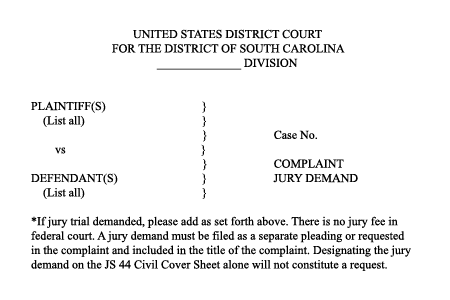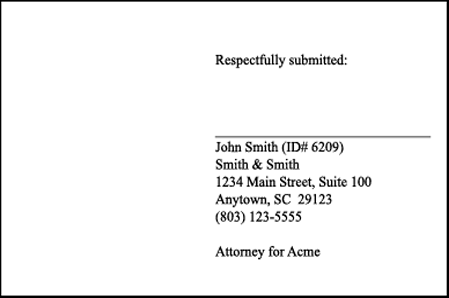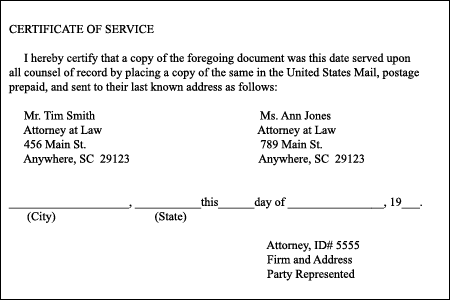Where to File
All pleadings, including originals and copies for the judge, must be filed with the Clerk's Office. This is done to prevent confusion.
Even if the judge is expecting a document from you, it should be filed with the Clerk. Please let the Clerk know if any
emergency situation exists when you file a document.
Emergency filings after business hours: If a filing cannot be made during
normal business hours, (Monday through Friday, 9:00 a.m. to 4:30 p.m.), but the
document must be filed that day, please call (during normal business hours)
the clerk's office in the division where the filing is to be made to make
the necessary arrangements.
The phone numbers for each divisional office are as follows:
Columbia
Matthew J. Perry, Jr. Federal Courthouse
803.765.5816 |
Florence
McMillan Federal Building
843.676.3820 |
Charleston
Charleston Federal Courthouse
843.579.1401 |
Greenville
Clement F. Haynsworth Federal Building
864.241.2700 |
Documents can be filed in any division in the district that accepts filings.
However, to expedite processing, please file according to the following list:
- Divisions 2 (Charleston) and 9 (Beaufort) are housed in Charleston;
- Divisions 1 (Aiken), 3 (Columbia), 5 (Orangeburg) and 0 (Rock Hill) are housed in Columbia;
- Division 4 (Florence) is housed in Florence;
- Divisions 6 (Greenville), 7 (Spartanburg), and 8 (Anderson/Greenwood)are housed in Greenville.
Exception: Social Security
and Prisoner 2254 and 1983 cases are housed in the location
of the assigned magistrate
judge.

Format for Filing
Effective March 4, 2002 the Clerk's Office will begin scanning and saving all
newly filed documents into the Court's image retrieval system. This will
enable subscribers to PACER to view and retrieve
actual documents. Information is current through the close of business (5:00 pm)
of the previous day. Parties filing documents are requested to adhere to the following
procedures to speed the efficiency of processing:
- Do not staple, spiral bind or velobind original documents; please use only paper clips, binder clips or
rubber bands to bind original documents. Copies may be stapled or otherwise bound.
- Do not separate attachments or exhibits with tabs. Copies may be tabbed. Although we are requesting that you do
not separate attachments or exhibits with tabs, a table of contents page is welcome.
- Two-hole punch original documents at the top to facilitate insertion in the file jacket. Copies should
also be two-hole punched at the top of the document.
Paper Size
All pleadings must be on 8 ½" x 11" paper, double-spaced.
Copies Required
All pleadings must be filed as follows:
Regular Civil Action: one (1) original plus one (1)
copy.
Regular Criminal Action: one (1) original plus one (1)
copy.
Three-Judge Panel: one (1) original plus two (2) copies.
Civil Inmate: one (1) original.
Social Security Cases: one (1) original.
NOTE: This listing is the Court's requirements only.
This listing does NOT include copies for service.
Style
- Please note that "et al" is not acceptable in the case caption of the Summons,
Complaint, or Notice of Removal.
- It is acceptable to use "et al" in subsequent filings.
- All subsequent pleadings must have a concise title.
- Numbering the parties in the case caption will enhance accuracy.
- Type or print all parties in the case caption with accurate capitalization
and spacing for each party. Examples: Martha vanDerkloot, James De´ Borne
- Do not prepare a separate summons for each defendant in a multiple defendant
case.
- If an affidavit is not attached to a pleading, it must have a cover page with
the heading, style, case number and the title of the pleading it supports.

Signature Block
Each attorney or pro se litigant must sign the last
page of the complaint and all subsequent filings, and
list address, telephone number and Federal I.D. number.
See Local Rule 83.I.04.


Service of Process
The plaintiff filing a new lawsuit has two options as far as service is concerned.
- A summons shall be served together with a copy of
the complaint. The plaintiff is responsible for service
of a summons and complaint within the time allowed under
Fed.R.Civ.P. 4 (m) and shall furnish the person effecting
service with the necessary copies of the summons and
complaint.
See Forms for Summons.
- Rule 4 of the Federal Rules of Civil Procedure requires certain parties to cooperate in saving costs of service
of the summons and complaint. Waiver of Service of Summons provides for an alternative to service. Waiver of Service
is accomplished when the plaintiff provides each defendant (but not an incompetent person or an infant) with a written
Notice of Lawsuit and Request for Waiver along with a Waiver of Service of Summons for the defendant's response
along with a copy of a newly filed civil complaint. You can also use the Notice of Lawsuit and Waiver of Service
in an existing civil action whenever parties are added to the lawsuit via an Amended Complaint, Third Party Complaint, etc.
See Forms for Notice of Lawsuit and Request for Waiver of Service of Summons and Waiver
of Service of Summons.
A defendant who is served with a Notice of Lawsuit and Request for Waiver of Service must return the executed
Waiver of Service and Summons form to the plaintiff within 30 days of the date the Notice of Lawsuit and
Request for Waiver of Service was mailed. Defendant's answer is due 60 days from the date the plaintiff mailed
the waiver. (All deadlines are calculated from date of mailing, not from date of receipt.) By waiving service,
a defendant is allowed more time to answer than if the summons had been actually served when the request for
waiver of service was received.
A written request to withhold issuance of summons must be submitted if no service is to be issued. Forms
are available in the Clerk's Office.
See Forms for Request to Withhold Issuance
of Summons.
NOTE Re: Certificate of Service: (Fed.R.Civ.P. 5)
After service of the complaint, every pleading, brief, or memorandum filed must include a certificate of
service stating that copies have been served on all parties or their attorneys.


Discovery
As soon as practicable but in any event, within 90
days after the appearance of a defendant and the complaint
has been served, (Fed.R.Civ.P. 16(b)), the court will
fix a scheduling order setting a time limit for discovery
for those cases which are not exempt from Fed.R.Civ.P.
26(a)(1)(E). Discovery in exempt cases must be completed
within ninety (90) days of the joinder of issues unless
otherwise ordered. See Local Rule 26.04.
- Filings
Except as provided in "b" below, in the District
of South Carolina, Interrogatories and Answers under
Rule 33, Fed.R.Civ.P., Requests for Production or Inspection
under Rule 34, Fed.R.Civ.P., and Requests for Admission
under Rule 36, Fed.R.Civ.P., shall be served upon other
counsel or parties, but shall not be filed with the
Clerk, except in support of a motion filed under Rules
26(c) or 37, Fed.R.Civ. P. or at the outset of trial.
See Local Rules 5.01 and 7.04 and 7.06.
- Notice of Deposition and Issuance of Deposition Subpoena
In order for a deposition subpoena
to be issued by the Clerk's Office, the original and one copy of the Notice of
Deposition must be filed.
- The Notice of Deposition should include:
- name and complete address of person being deposed;
- time of deposition;
- date of deposition;
- complete address of location where deposition is to be taken; and
- original, signed Certificate of Service.
- A deposition subpoena will be issued by the Clerk's Office only if the original Notice of Deposition is
on file with the Clerk or is presented for filing at the time the subpoena is to be issued. The information
contained in the notice must be the same as that on the subpoena. The deposition subpoena will issue from
the court where the deposition is to be held.
- Out-of-state Subpoena
An out-of-state subpoena may be required when a deposition is to be taken in a district other than that in which
the case is pending. Procedures for filing a Notice to Take Deposition may vary in different districts.
The District of South Carolina requires the following:
- A copy of the Notice to Take Deposition with the Certificate of Service bearing a signature on each.
- A fee of $30.00 per notice (not per name), payable to "Clerk, US District Court."
Note: The deposing party is responsible for the
payment of witness fees as required by law. (Refer to
28 US Code, Section 1821.) Federal Rule of Civil Procedure
45 (a)(3) permits attorneys to issue their own subpoenas
(civil cases only) without assistance from the Clerk's
Office. Subpoena Forms are available in the Clerk's
Office.
- Supplementing Discovery on Appeal
When documentation of discovery not previously in the record is needed for appeal purposes, upon an application
and order of the court, the necessary discovery papers shall be filed with the Clerk.
- Interrogatories
Fed.R.Civ.P. 33 (a) places limits on the number of
written interrogatories served by each party, without
leave of court or written stipulation.

Motions and Memoranda (Local Civil Rule 7.01-7.10)
- Each motion made other than in a hearing or trial
or to compel discovery shall be timely filed with an
accompanying memorandum setting forth the authorities
and legal principles in support thereof. (See Local
Rule 7.04).
- A memorandum in opposition must be filed with the
Clerk within fifteen (15) days of the service of the
motion. (See Local Rule 7.06).
- Unless an exception is granted by the court, no memorandum shall exceed:
- 35 double-spaced pages for an initial memorandum.
(See Local Rule 7.04).
- 15 double-spaced pages for a reply memorandum. (See
Local Rule 7.07).
- Motions for Enlargement of Time or Extension of
Discovery shall be accompanied by an affidavit or other
statement giving the reasons therefor along with a proposed
consent order. (See Local Rule 6.01)
- Motions to Compel Discovery: An explanation of the
basis of motion to compel (or in opposition) is required.
(See Local Rule 7.04 and 7.06).

Trial Exhibits
Five business days prior to the date set for submission
for pretrial briefs, attorneys must meet, mark exhibits,
and either agree on admissibility or notify the court
of any objection in the pretrial brief. All exhibits
must be numerically marked with exhibit stickers provided
by the Clerk. An exhibit list must be submitted in all
cases. See Local Rule 26.07.

Deficient Pleadings
Pursuant to Federal Rule of Civil Procedure 5(e),
the Clerk of Court shall "...not refuse to accept for
filing any paper presented for that purpose solely because
it is not presented in proper form as required by these
rules or any local rules or practices." The Clerk's
Office, however, does inspect papers for such deficiencies
which then are brought to the attention of the judge.
The presiding judge in the case may then direct the
Clerk of Court to return any deficient pleading or have
the attorney correct the deficiency. (See Forms.)

Filing Fees
CM/ECF users are required to pay fees online.
Click HERE for details.
Click HERE for the complete schedule of court fees.

|



